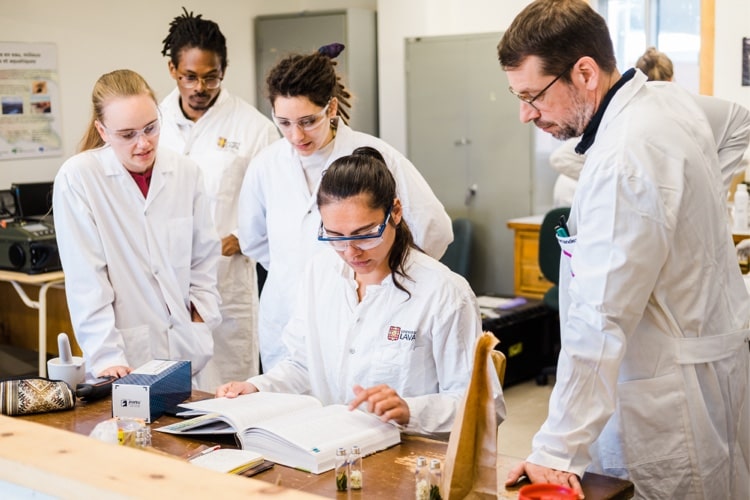Training
With more than 560 graduate students and postdoctoral fellows, the Sentinel North program fosters the development of a new generation of interdisciplinary scientists capable of addressing the major challenges of tomorrow. As a testament to the impact of the high-level training of the program's first graduates, the 2021-2022 year has captured the full measure of Sentinel North's innovative training strategy that attracts and trains the best students from Canada and abroad.
16  New Excellence Scholarships
New Excellence Scholarships
Selected for the innovative and interdisciplinary potential of their work, the recipients of the fall 2021 Excellence Scholarships and Postdoctoral Fellowships competition will greatly enrich the Sentinel North program with bold research themes focused on a better understanding of the northern environment and its impact on human health.
Alexis Trottier

Prise en compte des sols gelés pour des prévisions hydrométéorologiques plus robustes en région froide.
Direction: Daniel Nadeau, Vincent Vionnet
Catherine Dussault

Inuuniq: Mobilisation et production des savoirs traditionnels inuit en recherche.
Direction: Olivier Clain, Caroline Hervé
Catherine Villeneuve

Méthodes d'apprentissage par renforcement pour la modélisation du mouvement du renard arctique.
Direction: Audrey Durand, Pierre Legagneux
Charlotte Carrier-Belleau

Caractérisation et quantification des micro et nano plastiques dans l'Arctique et répercussions sur les ressources alimentaires des communautés locales.
Direction: Julien Gigault
Christophe Perron

Modélisation de la transmission lumineuse au travers de la couche de surface de la glace de mer à partir de l'historique météorologique régional
Direction: Marcel Babin, Dirk Notz
Christopher Bérubé

Valorisation de l'arbuste nordique Betula glandulosa pour le développement de nouveaux agents thérapeutiques biosourcés.
Direction: Éric Biron, Fernando Albericio
Dayani Loaiza

Quantification des facteurs influençant les ornières d'usure associées à l'utilisation des pneus à crampons.
Direction: Jean-Pascal Bilodeau, Benoît Fournier
Jacopo Profili

Contrôle de la germination de semences arctiques et subarctiques nordiques par un traitement plasma à la pression atmosphérique.
Direction: Véronic Landry, Damase Khasa
Louis-Charles Michaud

Sources laser fibrées émettant dans l'infrarouge moyen pour l'imagerie de gaz.
Direction: Martin Bernier, Daniel Nadeau
Marie Pierrejean

Structure des communautés et fonctionnement d'un écosystème benthique en péril: le dernier refuge de glace.
Direction: Philippe Archambault, Christine Michel
Marie-Hélène Carignan

What are the dietary, nutritional, and food security implications of changing ecosystems and country food harvest in Nunavik?
Direction: Mélanie Lemire, Tiff-Annie Kenny
Myriam Trottier

Conséquences ultimes de la manipulation des niveaux de stress lors des haltes migratoires chez la grande oie des neiges.
Direction: Pierre Legagneux, Frédéric Angelier
Philippe Fortier

Amélioration des prédictions de dégradation du pergélisol en considérant les processus liés à la présence d'eau souterraine.
Direction: Jean-Michel Lemieux, Michelle Walvoord
Simon Lizotte

Inférence bayésienne de la position des noeuds d'un graphe plongé dans un espace hyperbolique.
Direction: Antoine Allard, Pierre Marquet
Théo Guérineau

Fibrage et fonctionnalisation laser de verres moyens infrarouges germano-gallates de baryum pour la détection de gaz climatiquement actif dans le Nord.
Direction: Younès Messaddeq
Andréanne Girard-Lemieux

Quel rôle pour les Pessamiulnuat dans la gestion de la réserve de biodiversité Uapishka?
Direction: Jean-Michel Beaudoin, Louis Bélanger
9 engaging activities
Aligned with Université Laval's mission of "Excellence, Experience, Engagement", the Sentinel North training strategy has implemented many actions that have mobilized a diverse community of students, professionals and faculty in 2021-2022. By bridging disciplines, these activities have initiated enriching exchanges and opportunities for collaboration. Some have offered a transformative experience, involving local communities and supported by international mentors, such as the Nordicity and Advances in Natural Products Science Ph.D. school.

Taking part in the Ph.D. School has really been eye-opening regarding the need to have an interdisciplinary and multicultural vision of research projects. It allowed me to challenge and expand my ideas, which made me feel more mature and fulfilled in my scientific career.

Impact of Sentinel North on the development of key interdisciplinary skills
More than five years after the program's inception, it is now possible to see the impact of Sentinel North on Université Laval students and postdoctoral fellows. Leveraging the skills developed along the way, Sentinel North alumni are now becoming ambassadors of transformative research in various professional environments - with a placement rate of 45% in academia and 55% in private or public organizations.
The transdisciplinary framework from which the training program stems has allowed me to develop many skills that have contributed to my professional development.

